In this article we will go through all the pros and cons of living in Washington DC. The capital of the United States is an exciting and eclectic place to live, but it’s not without its challenges. By the end of this article you should have a pretty good idea if it’s for you or not.
For the purpose of this study, we are considering Washington DC to be the entire metropolitan area. The city itself is not large, and most of the DC metro area residents live in the surrounding suburban communities. The following counties are included as part of the Washington DC metro area:
- Fairfax County, VA
- Arlington County, VA
- Loudoun County, VA
- Prince William County, VA
- Montgomery County, MD
- Prince George’s County, MD
DC is dominated by the federal government. It seems that nearly everyone works for the government or has the government as a client. But there are many private industries that thrive here without government contracts. Job opportunities are abundant, so assuming you have one of those, let’s get into the pros and cons of living in Washington DC.
- My Credentials
- Washington DC – Quick Glance
- The Pros and Cons of Living in Washington DC
- Pro #1: The Salaries
- Con #1: High Cost of Living
- Pro #2: Public Transportation
- Con #2: Traffic
- Pro #3: You can get any type of food your heart desires
- Con #3: Going out will cost you an arm and a leg
- Pro #4: Reasonable winter weather
- Con #4: The summer humidity
- Pro #5: The National Mall and Classical Architecture
- Con #5: Politics and pretentious people
- Pro #6: Free things to do
- Con #6: The region is so spread out
- Pro #7: The city has character
- Con #7: Cookie cutter suburbs
- Pro #8: It’s almost recession proof
- Con #8: Incredibly competitive work environment
- Pro #9: American history at your doorstep
- Con #9: It’s hard to really get out of town
- Pro #10: Great brewery and winery scene
- Con #10: It’s a very fast-paced city
- Pro #11: It’s very diverse
- Con #11: Everybody is just so… busy
- Pro #12: It’s very well-connected to the rest of the world
- Con #12: Taxation without representation
- Pro #13: It’s a very healthy city by American standards
- Con #13: Increasing homelessness
- Pro #14: It’s an excellent place to raise your children
- Final Word
My Credentials
First, however, let me just briefly explain why you can trust the information in this article. Any Joe Schmo can write anything on the internet these days. But I grew up just outside of DC in Fairfax, VA and have spent the majority of my life in and around the city.
While I’ve lived in many places, such as New Zealand, Amsterdam, Groningen, Las Vegas, and Austin, DC has always been home. I’ve worked in the city, outside the city, and remotely. I know the area like the back of my hand.
And since I’ve lived in so many other cities and countries, I have a unique perspective on what makes a city livable when compared to people that have spent their entire lives here.
Let’s start with a personal opinion on living in Washington DC: Of all the places I’ve lived (Wellington, Amsterdam, Las Vegas, and Austin), it’s my least favorite. But take that with a grain of salt, as those other cities set a super high bar.
DC is a great place to live. It has a very high standard of living and superb economic opportunities. But it can also be a struggle for many people. It depends what you’re looking for and what you do for work. That’s why we are going to go through all the pros and cons of living in Washington DC right now.
Washington DC – Quick Glance
Population: 6.4 million metro area, 670,000 city proper
Time zone: Eastern Standard
Climate: Humid subtropical – cold, dry winters and hot, humid summers
Median home price in 2024: $609,000
Average rent for 1 bedroom apartment in 2024: $2,645
Violent crime rate in 2024: 597 per 100,000, which is on the high side
Main industry: Federal government
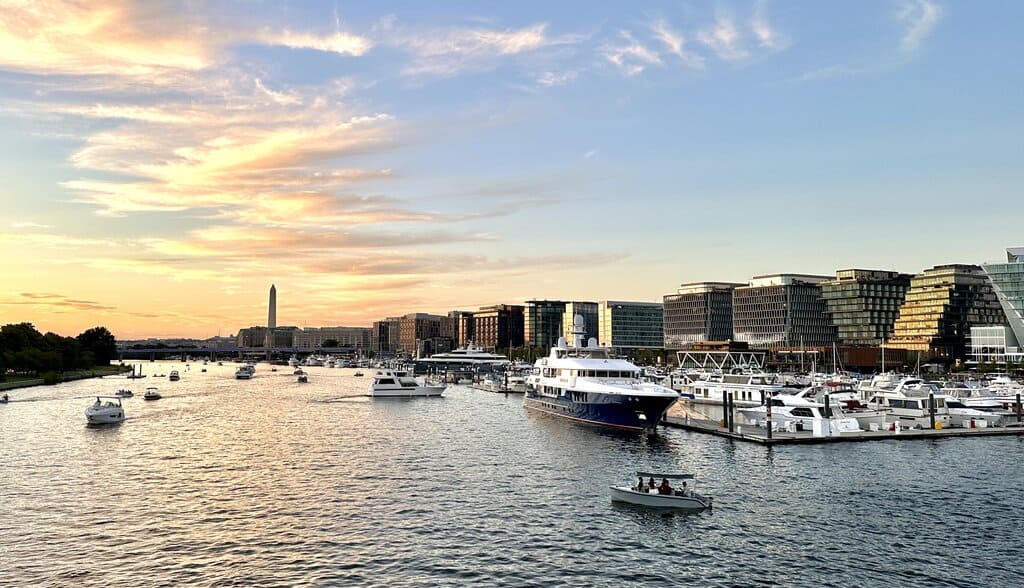
The Pros and Cons of Living in Washington DC
If you’ve found this page you’re probably wondering if you should move to Washington DC or not. So without further ado let’s go through the pros and cons of living in Washington DC. We will go through them in a pro, con, pro, con, etc format. Then you can make an informed decision if living in the nation’s capital is for you!
Pro #1: The Salaries
When it comes to places to move to make the most money, Washington DC is near the top of the list. Only New York, San Francisco (the Bay Area), and possibly Los Angeles will pay you more. Washington is a high-income area and that is reflected in your salary.
The high salaries come with a high cost of living (see con #1 below), but the ratio of salary to cost of living is actually one of the best in the United States, and indeed the world. You will be rewarded handsomely for your work in DC and you’ll likely save significant money (unless you go out on the town too much, see con #3).
Now keep in mind that I’m talking about professional jobs here, such as doctors, lawyers, consultants, engineers, construction managers, plumbers, etc. Jobs that require a degree or certification. The same cannot be said about working in retail or the service industry, though due to the cost of living you are likely to make more than the same position in say Cleveland.
As an example I had job offers in 4 different US cities before deciding to move back to DC in 2020. The offer in DC was 20% higher than the next highest offer and 35% higher than my offers in Miami and Las Vegas. And the cost of living in Miami is not that much less than DC.
Con #1: High Cost of Living
Speaking of cost of living, let’s get into that. No matter what ranking or what metric you look at, Washington DC falls in the top 10 most expensive cities to live in the US. If we look at, for example, CNBC’s ranking for 2023-2024, DC comes in at #7. But they separate Brooklyn and Manhattan, and also Los Angeles and Orange County. So really it’s #5 on their list, behind only New York, Honolulu, San Francisco, and Los Angeles.
Life is pricey in the nation’s capital. Housing costs are monumental, and goods and services are through the roof. Want to remodel your kitchen? You can literally buy a decent entire house in Wisconsin for cheaper.
Groceries are expensive. Daycare is expensive. Repairs and maintenance for your home and vehicle are expensive. Everything is expensive. But the thing that hits people the hardest is the home prices and rental prices.
While home prices are not as expensive as in coastal California, you have to be making significant money to be able to purchase something. For most Gen Z’s just getting out of college, purchasing a home is a pipe dream without mommy and daddy’s money.
Even renting an apartment can be difficult. If you want to live on your own just be prepared to fork over a solid chunk of your paycheck to your landlord. Most people choose to live with 1 or 2 other roommates to make rental prices more bearable. If you’re below 30, it’s advised to live with others and try to save your money for a future home purchase.
Pro #2: Public Transportation
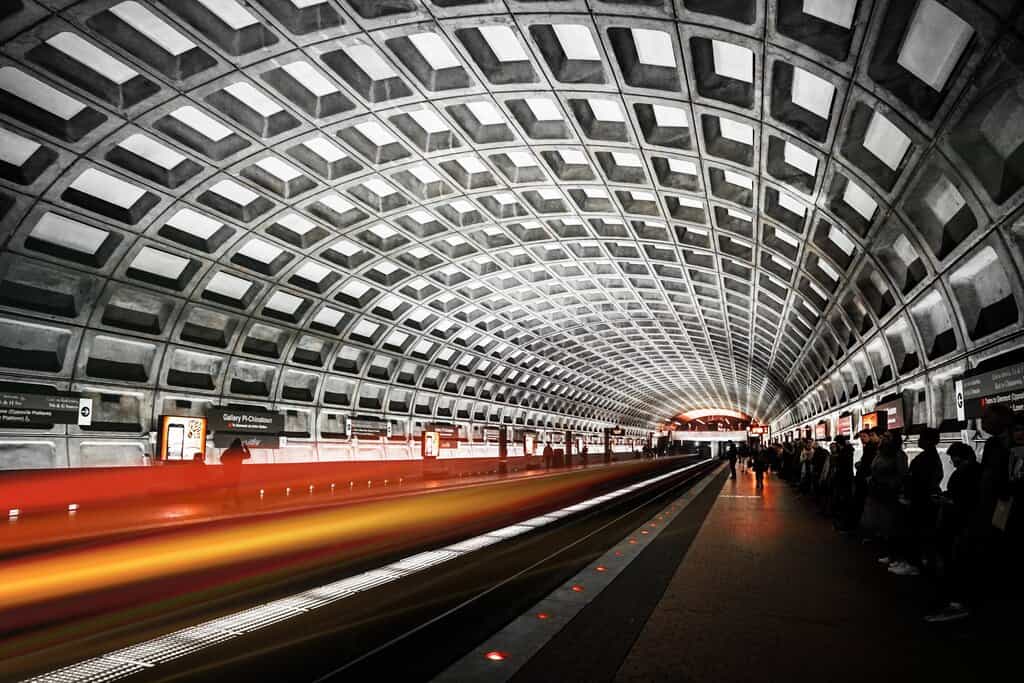
For an American city, DC has excellent public transportation. Let me stress that point again: for an American city… You’re not going to be fooled into thinking that you’re in London or Amsterdam by any stretch of the imagination. But DC does have an extensive underground subway system. It’s not as nearly as extensive as New York City’s, but it’s a hell of a lot cleaner!
In most US cities you are completely reliant upon your car. However, if you live in DC proper or Arlington, VA, it’s possible – and even preferable – not to have a car. There are 6 metro lines and they run throughout the city and into the suburbs. If you’re in the city center, you’re likely no further than a 5-block walk to the nearest metro station.
Outside the city center the stations get more spread out, and once you get into the suburbs of Maryland and Virginia, the metro rails basically follow a straight line with stations every 2-3 miles or so until they end. If you live outside of DC or Arlington, VA it’s almost necessary to have a car. Even if you live right by a metro station, your life will be easier with a car unless you’re in DC or Arlington.
As of November 2022, the Silver Line metro runs to Dulles Airport, meaning that now both DC airports are accessible on public transportation.
Aside from the metro system, there are dozens of bus routes that connect the other parts of the city, reaching deep into the suburbs. The buses are operated by the same authority as the metro and they use the same “SmarTrip” card.
However you look at it, DC has excellent public transportation compared to the vast majority of other American cities.
Con #2: Traffic
Even with all the public transportation options, the roads in and around the nation’s capital are jam packed seemingly all of the time. I mean, there are over 6 million people here. 8 million, if you include nearby Baltimore and its suburbs. That’s a lot of people!
The Covid-19 pandemic did vastly improve traffic in DC. A sizable chunk of those 6.4 million people work in professional jobs where remote and hybrid work has become more acceptable. So instead of literally everyone going into the office every Monday morning, these days only about half of those people are. But do the math, that’s still a lot of people!
The I-495 Capital Beltway is better than it used to be, but typically backed up at the Virginia to Maryland bridge on the inner loop. And during morning and evening rush hour, you’re likely to be moving pretty slow anywhere on the beltway. The worst time to drive, however, is Saturday afternoon, as seemingly everyone in the region goes out for a drive on Saturday afternoons.
Pro #3: You can get any type of food your heart desires
My personal favorite thing about living in DC is that you can get just about any cuisine you can think of. Craving some Bolivian saltenas? Or Ethiopian injera? What about Ukrainian borscht? Or maybe just a good ole Texas barbecue brisket. DC has it! With people from all over the world living in DC, the culinary experience in the city and surrounding suburbs is second to only New York City (and maybe San Francisco).
The best part about the restaurants in DC is that the casual, more hole-in-the-wall ethnic places have amazing food. The nicer, more expensive restaurants in the city center are good, sure. But the best food you will find will be outside the city center in the various neighborhoods and suburbs.
Here are some recommendations for various styles of more uncommon ethnic foods. There are, naturally, hundreds of Chinese, Indian, Thai, and Mexican restaurants all around. Not to mention incredible contemporary American restaurants. But the best part of DC is the food you might not be able to find in other cities.
Peruvian: La Granja De Oro, Falls Church
El Salvadorian: Pupuseria La Familia, Falls Church & College Park
Bosnian/Balkan: Ambar, Clarendon & Capitol Hill
Georgian: Supra, city center
Bolivian: Luzmary’s, Fall’s Church
Ethiopian: Elfegne, Adam’s Morgan
Israeli: Jerusalem Mediterranean, Falls Church
There are many more, but these will get you started.
Con #3: Going out will cost you an arm and a leg
We’ve already talked about how expensive it is to live in Washington DC and the surrounding suburbs. But let’s examine the cost of food, drink, and entertainment and the culture of going out in DC a little more.
Restaurant prices in the city center are not totally astronomical like New York City, but they can be deterring. It obviously depends greatly on the type of restaurant you’re going to. Using an example of a run-of-the-mill, casual American food place with local beers on tap and a decent wine list, some expected prices (not including 10% tax and 20-25% tip of course) are as follows.
- A local craft beer: $8-10
- A cheap domestic beer like Miller Lite: $6-7
- Soft drink: $2-3
- Burger with fries: $16-17
- Chicken sandwich: $16-17
- Standard entree: $20-30
- Appetizers: $8-15
So let’s say you and you just go out for a burger and a decent beer, no appetizer or second drink. You’re looking at a minimum of $31 per person. And that’s literally just for a burger and beer. If you want to go somewhere nice and share a bottle of wine with your partner, you’ll be hard pressed to walk away with a bill under $100.
Eating at ethnic restaurants is usually the most cost-effective way to eat out in the city (and the suburbs). Drinks are usually far cheaper and the food is usually considerably cheaper (though Indian restaurants are becoming very expensive these days).
In terms of entertainment, the prices aren’t that much different than other US cities. But there is always something going on in DC, something to go to, or somewhere to take a friend in town to visit. There’s also a culture of going to places “to be seen” that people that work on Capitol Hill fall into.
No matter how you put it, going out and enjoying a dinner or a night on the town will cost you in DC!
Pro #4: Reasonable winter weather
Back in the 1990s the DC area used to endure some pretty brutal winters. Blizzards were common and the lakes would freeze over every year. A snow shovel and de-icing salts were a necessity for any household.
But these days pond hockey is a pipe dream, and if you want to shovel through 6 feet of snow you better head to Pittsburgh or Buffalo. Since the Snowmageddon of 2010, which dumped over 2 feet of snow on the city, the winters have been downright mild. Snow still falls, but it’s not nearly as common as it used to be.
The DC area averages about 13.8 inches of snow per year. This is based on data from 1990-2020, and it’s reducing more and more each year. In the early 1900s it received over 20” per year. The winter of 2022-2023 produced a meager quarter inch of snow.
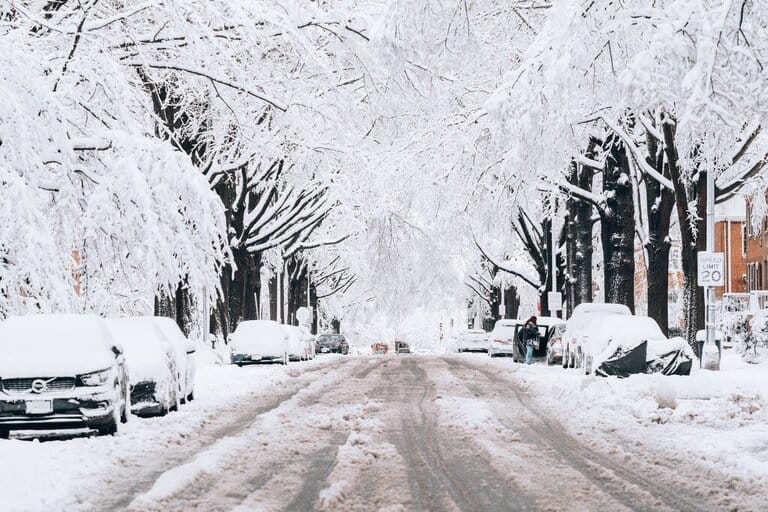
Winter temperatures have also been rising year after year (thanks climate change???). The average January high and low is 43 (6 C) and 25 (-4 C), respectively. But in recent years, the temperatures have been far higher.
On Christmas day 2021 it was in the mid 60s and people were having outdoor barbecues. In January 2023 it hit 60 (15.5 C) on six different days. On Feb 23, 2023 it was literally 81 degrees (27 C) in the city. Days like these, while once very rare, are now becoming more normal.
Now none of this is to say that every coming winter will be snow-free and comfortably warm. It can still get damn cold, and no one knows what the future will hold. But the trend in the area is for warmer and drier winters.
Don’t go throwing away that jacket just yet, but the winters here are considerably more comfortable than inland cities of similar latitude like Cincinnati, St. Louis, and Denver.
Con #4: The summer humidity
Summers along the east coast can be pretty brutal. While it might not be as hot as it is down in South Carolina or Georgia, DC can still get pretty damn hot, and when you combine it with that east coast humidity, it can be downright gross outside.
From about mid June to early September the morning humidity can be oppressive. It’s not uncommon to wake up to 75 degrees (24 C) with 90% humidity. You break a sweat just walking from your front door to your car. The humidity reduces as the temperature rises throughout the day, but still remains in the 60-70% range usually.
90 degrees (32 C) with 65% humidity is not a whole lot of fun. But if you ask me, I’ll take that over 75 and 90% humidity. I still choose to do my summer runs in the morning to avoid the beating sun, however. By the time I’m done it takes me an hour to stop sweating.
Whether it’s DC, Philadelphia, NYC, or Charleston, anywhere on the east coast is miserable for a few months in summer. Occasionally you get that rare non-humid morning – and it’s super rare – but that’s an exception to the rule. You will sweat, and you will be hot. Welcome to DC!
Pro #5: The National Mall and Classical Architecture
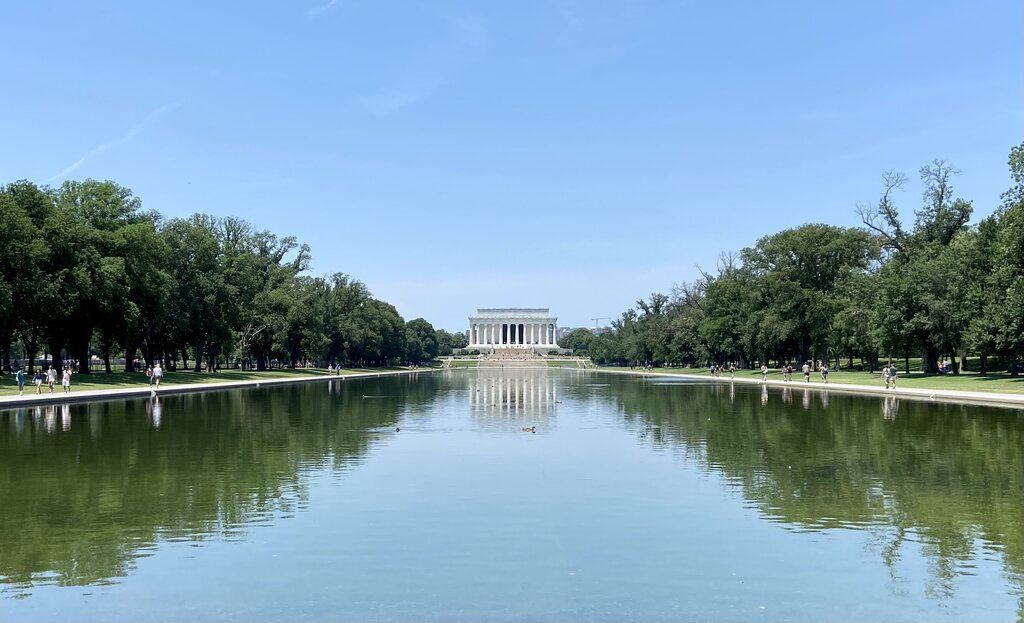
The National Mall is many things, but one thing it is not is an actual mall. It’s a federally protected area at the south side of the city that contains most of the city’s famous monuments, memorials, and museums. Here you’ll find the Washington Monument, the US Capitol Building, the Lincoln memorial, the Vietnam Veterans Memorial, nearly all the Smithsonian museums, and much more.
The land is managed by the National Park Service and it’s incredibly well-maintained. Most of the city’s main tourist attractions are located on the National Mall, which stretches about 3 miles from the Lincoln Memorial to the Capitol building. It’s a truly unique region and makes DC unlike any other city in the US and perhaps the world. Not to mention that the White House is just a stone’s throw away.
On top of the National Mall, DC is incredibly unique in many other ways. The city was laid out by a French city planner and bears a striking resemblance to Paris in terms of the organization of major roadways. On top of that, most government buildings are designed to resemble classical Roman and Ancient Greek buildings.
What’s more, no building in the city can be over 160 feet tall due to a federal regulation passed in 1910. It’s just a myth that the height limit has something to do with not being taller than the US Capitol building. It was just how city leadership wanted the city to look. The law still exists and today DC is the only major city in the United States without tall buildings, giving its skyline a remarkably unique look.
It’s hard to argue that DC is not one of the most attractive cities in the US. Sure, there are homeless camps and run down areas just like all major cities, but a sunset over the National Mall is tough to beat!
Con #5: Politics and pretentious people
With government comes politics. You simply can’t escape it in DC. You are just down the road from where everything you hear about in the news actually happens. A lot of people have a lot of power, and you feel that living here. It’s possible to live an apolitical life in DC, but it’s tough to be completely disengaged from it.
Many people in DC are also out of touch with what goes on in “real America”. By that I mean the whole Main Street vs Wall Street argument. It’s a highly educated city full of lawyers, diplomats, politicians, and consultants. What happens in small town America is not really understood here.
Here people care about where you went to school and what you do for work. If you didn’t go to the right college, you might be judged inadequate. If you do a working class job you might be judged by pretentious young Yale grads for that too. Not everyone is like this, but too many people in DC care about what’s on your resume and not who you actually are.
Pro #6: Free things to do
For Pro #5 we discussed the National Mall. But we didn’t even get into probably the best part about the National Mall: it’s all free!
Yes. That’s right. All the museums are free. All the monuments are outdoors and free. Tours of the US Capitol are free. The Library of Congress is free. It’s simply amazing how many incredible things there are to do in Washington DC that won’t cost you a dime.
To be clear, there are museums in DC that are not free. These are privately owned museums that are not affiliated with the Smithsonian Institution. All the Smithsonian museums – which are the famous ones like Air and Space Museum and Natural History Museum – are free to all.
The museums are partially federally funded (for as much as Americans hate paying taxes it’s a superb use of our tax paying dollars) and partially funded by private donors. Many people and corporations donate a lot of money to the Smithsonian to keep all the fanatic museums free.
The National Mall is owned by the National Park Service, so again American taxpayer dollars at work. In this day and age it’s simply incredible that DC’s tourist attractions are still free for all who wish to visit. It really sets the city apart and makes visiting these historic places so much easier for everyone.
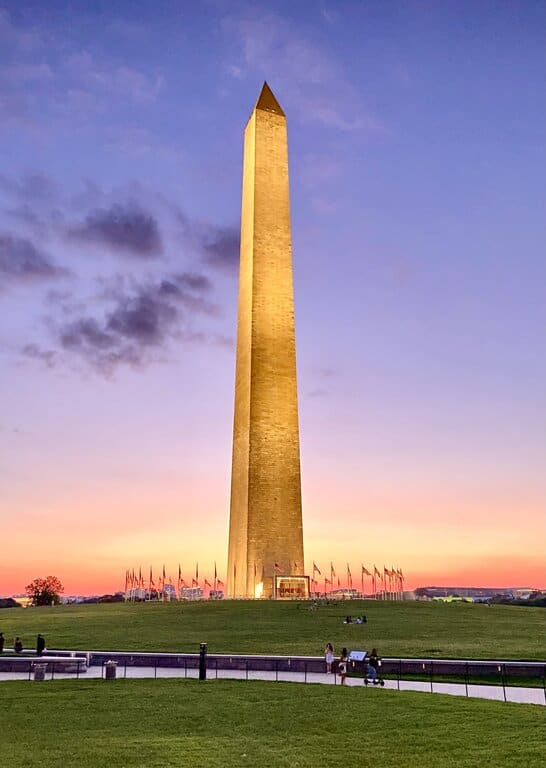
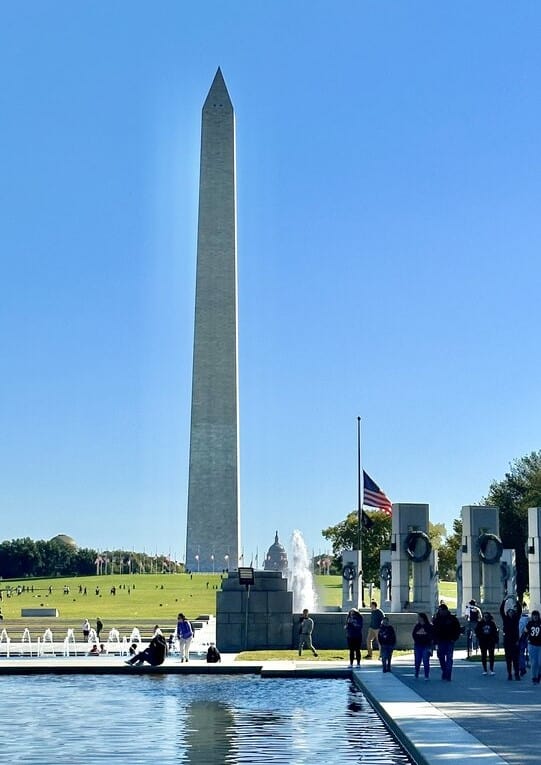
Con #6: The region is so spread out
Like many major American cities, the DC region is incredibly spread out. The city center is pretty compact, and from there the suburban sprawl picks up and spreads literally 30 miles in each direction into Maryland and Virginia.
Considering that over 85% of the people in the region don’t live in DC proper, you’ll likely have friends that live a legitimate journey from you. If you live in Fairfax City, VA, meeting a friend who lives in College Park, MD is a whole ordeal. Remember what I said about traffic?
Don’t even think about making plans with them for after work on a weekday. And those particular suburbs aren’t even that far out there. An extreme example would be if you live in Woodbridge, VA and visit a friend in Germantown, MD. That’s a solid hour’s drive without traffic!
The suburban sprawl is also tough to escape when you want to get away. Unlike somewhere like Denver where you can drive 20 minutes and be hiking in the mountains, you need to drive a while before you’re away from everything.
From the city center, it’s about 40 miles out west into Virginia before you stop seeing exits and shopping malls every 2 miles and finally feel like you’re in some sort of natural setting.
Heading northwest through Maryland? That’s about 30 miles before you’re free. And if you’re heading up I-95 northeast in Maryland just forget about it. You soon hit Baltimore, then Wilmington, Philadelphia, Newark, New York. Might as well just keep driving till you’re north of Boston into New Hampshire!
Pro #7: The city has character
As we discussed before, Washington DC is a unique city. The National Mall and all the government buildings with ancient Roman and Greek architecture really give it a special look.
Even outside of the federal office buildings and National Park Service land, the city has character. Each little neighborhood in the city has its own charm. You’ll find beautiful old row houses from the 1800s in Capitol Hill (starting at about $2 million if you’re in the market for a new home) and embassies of nearly every country in the world in Kalorama.
While the same cannot be said about the suburbs, there are some diamonds in the rough. Alexandria, VA is one of the most beautiful and charming old towns in the United States. Dating back to the 1700s, Old Town Alexandria features cobblestone streets and colorful wooden houses. If you live in Virginia, Old Town Alexandria should be a regular stop.
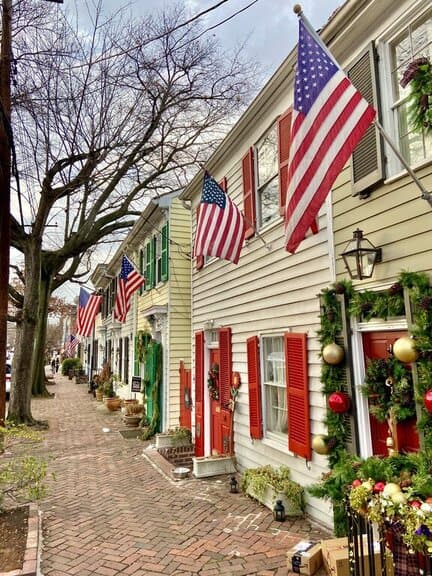
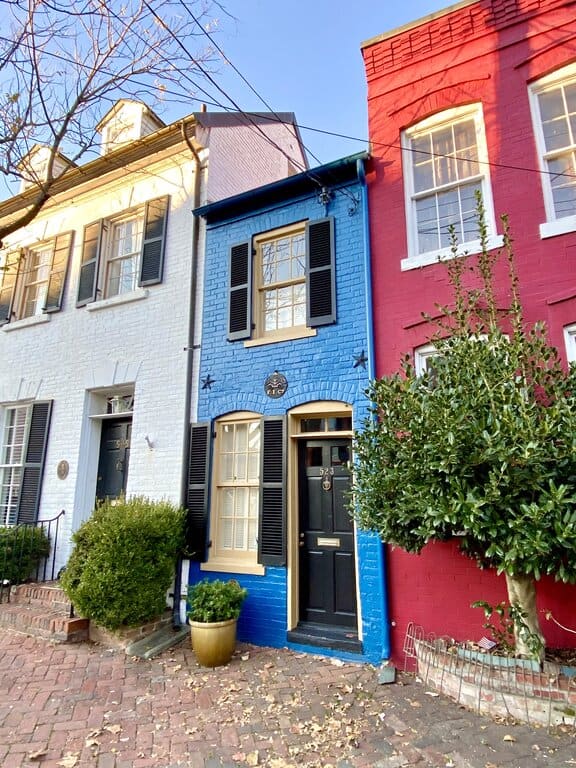
Con #7: Cookie cutter suburbs
This can be said about just about every suburban American town, but while central DC, Alexandria, and a few other places have charm, the suburbs are, in general, mostly characterless and dull. It’s just houses and strip malls. But hey, this is the United States. It’s what we do.
I should add here that in terms of American suburbs, the DC suburbs have a lot more park space and forests than others. Most suburban areas are quite old and were built back when developers still cared about creating a comfortable living experience and not just packing as many houses as tightly together as they can. Yards are mostly sizable and tree-trimming contractors are always in demand.
If you’re concerned about being bored in the suburbs, then live in the city, in Alexandria, or in Arlington, VA.
Pro #8: It’s almost recession proof
The local economy in DC is based almost entirely on the federal government. About 25% of people in the region work for the federal government. And while private industries are abundant, the source of that money almost always comes back to the government. Let’s use a few personal examples.
I work for a small business. A small structural engineering firm. My main projects are US government buildings. So even though I don’t work for the government, the government is one of my main clients.
Let’s use a more roundabout example. I paid a contractor to renovate a bathroom in my home after moving in. That money came from my paycheck, which I earned by designing a luxury assisted living apartment complex in Maryland. The property manager charges an arm and leg for their apartment, which are mostly filled by ex-lawyers and consultants who advised government agencies in their heyday. Many degrees of separation, but the money in that contractor’s hand still traces back to the government.
So why mention all of this? Well, when there’s a recession, what happens when private employers start laying off their employees? That’s right. Government bailouts. Corporations and even private individuals (as in the Covid-19 recession of 2020). The federal government still operates in a recession, and is usually even busier.
So with nearly all the jobs in the region being directly or indirectly related to the government, DC is almost recession proof. Sure, you’ll still feel it, as private citizens holding their cash and not spending it affects everything. But in a major recession, you’re far more likely to keep your job in DC than in other major cities.
When I lost my job in Las Vegas in 2010 I applied for dozens of jobs across the United States, from San Diego to New York. And the only place I could even get an interview was Washington DC. I ended up taking a job in the city and nearly all our projects for the next two years were federal government buildings.
So what happens when the government shuts down, as it seems to do often these days? Well, things get a bit tricky, but it’s not like recession looms. Most vital organizations keep running, and luckily the shutdowns usually only last a couple weeks.
Moral of the story: your job is safer in DC when recession comes.
Con #8: Incredibly competitive work environment
Some people might see this as a positive, but the work environment in DC is pretty cutthroat and competitive. Everyone is trying to be better than everyone else. Long hours are common, often without financial reward.
It might not be as hard core as New York, but it’s not difficult to get burned out if you get sucked into the DC work culture. If you’re working in DC, it’s important to have a solid work/life balance and make it a priority. Your health is more important than your career!
Pro #9: American history at your doorstep

Children growing up in DC take for granted that they live in basically an open-air history museum. I know I did. I didn’t fully appreciate it until a teacher friend in Vegas told me about the class field trip they took to a silver mine. A silver mine…. Then it hit me just how special it was to grow up in DC.
Typical trips for school children in the DC region include:
- US Capitol Building
- White House
- Mount Vernon (George Washington’s house)
- Smithsonian museums
- Arlington National Cemetery
- Manassas National Battlefield
And many more. Plus all the local sites, within a few hours of DC is a boat load of more American history. As a child we also took school field trips to:
- Gettysburg
- Antietam Battlefield (where Civil War ended)
- Colonial Williamsburg
- Jamestown (one of the first permanent European settlements in the US)
- Monticello (Thomas Jefferson’s house)
And, of course, many more. All of this is right in your backyard when you live in the DC area!
Con #9: It’s hard to really get out of town
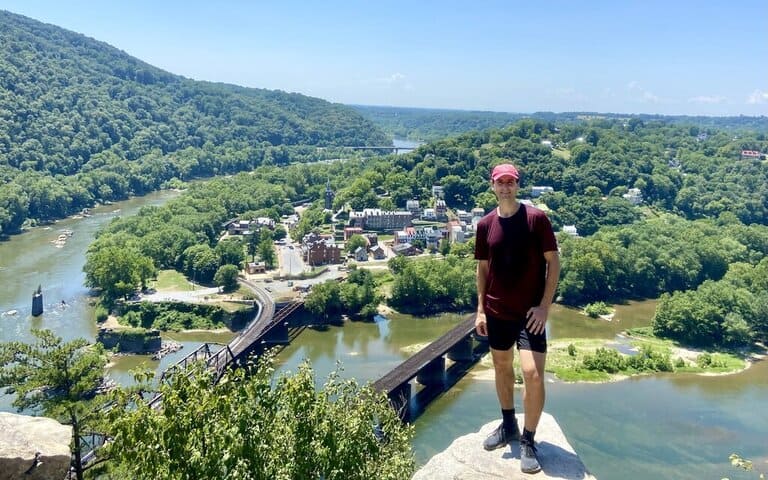
We’ve already mentioned the suburban sprawl of DC, but let’s hark on that some more. The region is so spread out that it’s really hard to get away from it all. There are some nice state and regional parks in the suburbs with significant green space, but if you really want to get out into nature and away from people, it’s gonna take a while.
How long it takes to get out of the region depends on exactly where you live. Considering the White House as the city center again, it’s about 40 miles (64 km) in any direction to really get into the open. That doesn’t include going northeast though, as you literally have to drive all the way past Boston 500 miles north to get away from things in that direction.
If you don’t like being around other people, DC is not the place for you. Even when you get out into some of the hiking areas in the Shenandoah mountains, 1-2 hours from the city, they’re still packed full of people from DC. There are so many people in the region and everyone is looking to get away on a nice summer Sunday. So it’s just really busy at many of the nice places even outside the city.
If you truly want to get away from it all, I suggest booking a flight to Montana. This can be said about really any city on the east coast of the US. There are just so many people!
Pro #10: Great brewery and winery scene
The Washington DC region has a ton of great breweries. Like other cities, most of these have popped up since 2010. And more pop up every day.
There are some seriously cool places to get a delicious brew in DC and the suburbs. And if you want to drive a little further outside the city – about an hour or so – you’ll find a bunch of “farm breweries.” These are basically giant breweries on old farms that can comfortably entertain hundreds of people. They’re quite an awesome way to spend a nice Saturday!
Virginia and Maryland also have a ton of wineries, way more than you’d expect. The prime wine country for the DC region is Loudoun County, VA. On any given weekend day you can join other socialites looking to escape the city and drink some wine in the rolling foothills of the Blue Ridge Mountains.
As you might imagine, DC area wine is not the best, and it’s quite overpriced. But it’s not bad overall. Some wineries actually make some really good wine. The humid climate of northern Virginia is not ideal for growing grapes, but it works. The wineries themselves are beautiful and set up to accommodate hundreds of people. Another great way to spend a nice weekend afternoon!
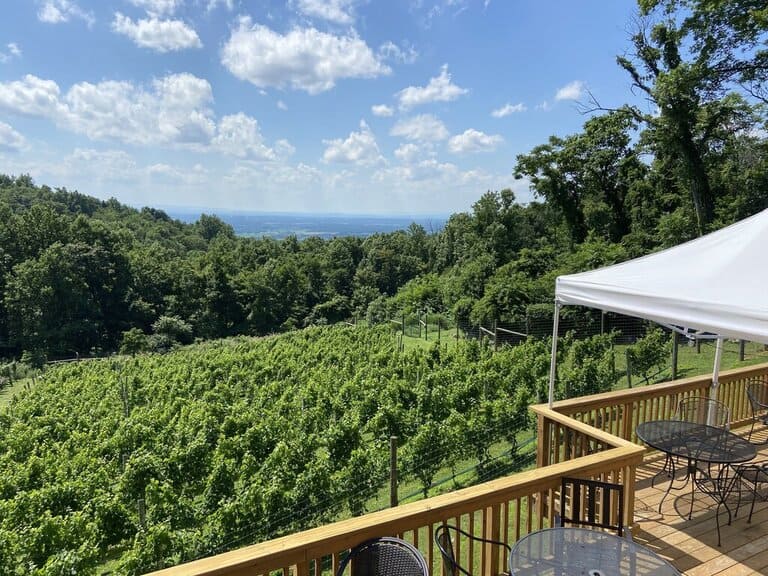
Con #10: It’s a very fast-paced city
If you’ve never been to the east coast of the USA before, one of the first things you might notice when you explore the cities is just how damn fast everyone walks. Everyone in DC just seems to be in such a hurry. It’s a microcosm for the lifestyle in DC. It’s super fast-paced.
Italians pride themselves in living “la vita lente”, the slow life. DC is the exact opposite. Life moves 100 miles per hour in DC. If you don’t keep up, you will fall behind.
And I’m not just talking about the work culture, which we’ve already discussed in a previous post. Social life is fast paced too. There is always something to do and someone to see. If you’re someone who needs your down time, it might be tough to adjust to life in the nation’s capital.
Pro #11: It’s very diverse
Being the seat of the government for the most powerful nation in the world, DC has residents from all over the world. Literally every country. And on top of all the foreign diplomats, DC has plenty of other expats and other immigrants.
The DC region is a minority dominant area. Meaning that non-Hispanic whites make up a minority of the population. The approximate demographics are:
- Non-Hispanic white: 43%
- Black or African American: 24%
- Hispanic or Latino: 17%
- Asian: 11%
- Other/mixed: 5%
Even within these demographics it’s incredibly diverse. For example, the largest chunk of that 11% Asian population is Indian, followed by Chinese and Korean. There are large groups of people from literally everywhere living in DC.
Pretty much everywhere you go, you will see people from all the demographic groups. Except inside the Capitol building. Then it’s back to mostly old, white men. But hey, even our politicians are getting more diverse, so maybe in a few decades…
Con #11: Everybody is just so… busy
Maintaining relationships with people you don’t live with can be downright difficult in DC. Everyone is just so… busy. All the time. It’s almost like people in DC don’t like to have free time. If there’s free time, better fill it with something.
Young professionals are typically booked out with softball games and yoga classes and after work happy hours. While the older folks are trying to get by raising kids and working 50 hour weeks.
The dating scene in DC can be tricky to navigate. You might have to wait a week or two to see someone again just because they have so many things going on. Not because they don’t like you. OK, maybe also because they don’t like you!
Point is, folks in the nation’s capital like to stay busy. Whether this is a good thing or a bad thing is up to your personal interpretation. But just know that planning things with friends can be challenging. Not to mention how far away everyone lives! See con #6.
Pro #12: It’s very well-connected to the rest of the world
Being a major population center on the east coast of the US, Washington DC is very well connected to the rest of the world. Only New York City (and possibly Atlanta due to all its flights to Latin America) offer more direct flights to major international destinations than DC.
This is mostly related to how diverse the city is and all the major ethnic groups living here. On top of being able to catch a flight to just about every major European city (with the notable exception of Oslo, Stockholm, and Helsinki), you can also fly direct to India, Ethiopia, Ghana, South Africa, Saudi Arabia, Egypt, Jordan, Israel, Brazil, Japan, South Korea, and many more.
Domestically, between the three airports that serve the region – Dulles International, Reagan National, and Baltimore Washington International – you can catch a direct flight to literally just about anywhere that has a passenger airport in the US east of the Rockies, including places like Burlington, VT, Savannah, GA, Cedar Rapids, IA, or Tulsa, OK, to name a few.
DC is also well connected by rail to the rest of the northeast USA. Train travel in the US is abysmal when compared to Europe or east Asia, but the northeast corridor is well connected and it’s a popular way to get between DC, Baltimore, Philadelphia, New York City, and Boston.
No matter how you look at it, DC is a well connected city.
Con #12: Taxation without representation
If you live in the DC city limits you get to join a select group of Americans – along with Puerto Rico and our other territories – that have literally no say in our democracy. It’s flabbergasting when you think of it, but DC was a lot different 250 years ago and the way the constitution was set up, DC has no voting member of congress.
When the founders wrote the constitution they couldn’t imagine that one day 700,000 people would be living in the city. If they had, maybe they would have given DC some representation.
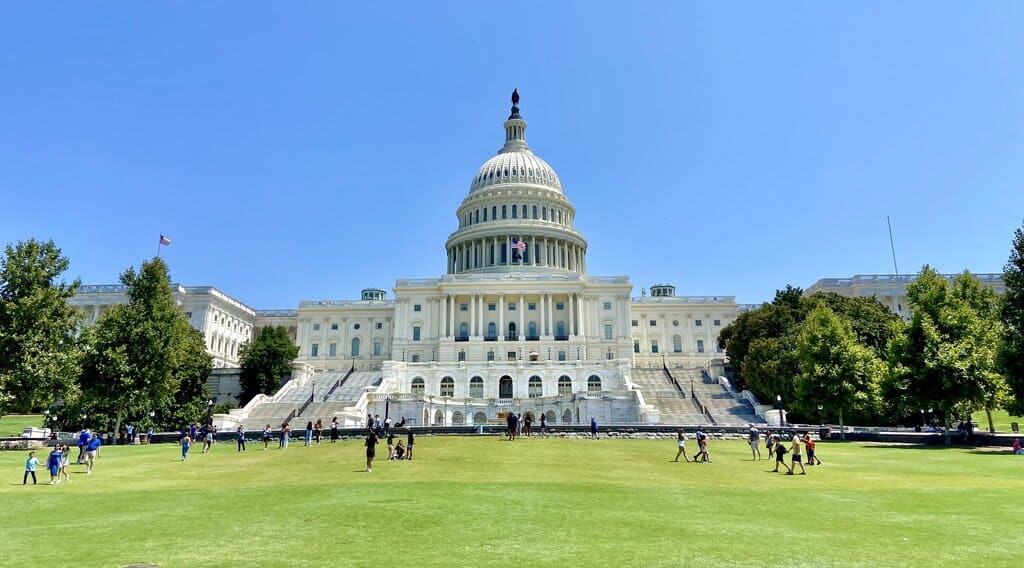
DC has one representative in the House of Representatives and no members of the Senate. The House member can introduce legislation, like the push for DC statehood, but cannot vote on bills. It’s a symbolic position, really. You can take solace in the fact that, unlike Puerto Rico, at least you can vote for president, as DC gets 3 votes in the electoral college.
Will DC ever achieve representation in Congress? No. It will not. Unless there are fundamental changes to the way the government is set up, DC will remain on the sidelines in congress. The Republican dominated states will never approve statehood for DC.
You can call me a pessimist, but it’s the cold, hard reality. So if you’re moving to the city, just know your voice in our democracy won’t be heard. If you live in Virginia or Maryland, this is not an issue.
Pro #13: It’s a very healthy city by American standards
When it comes to American cities where people are the most fit and active, Washington DC ranks near the top of most lists. In general, DC residents are less overweight than the average American and more conscious of their eating habits and overall health.
It’s not exactly the amazing weather which leads to this, but there is a lot of green space in the city and suburbs. There are also great medical facilities and healthy fast-food establishments. It’s also ranked as the third most educated city in the US (after only Ann Arbor, MI and San Jose, CA), and there is a well-known strong correlation between education and obesity levels.
You might not notice it living here, as it really only becomes apparent when you leave the city and travel to somewhere in the South or Midwest, where the population is considerably less healthy.
Lastly, note that while it’s a very fit city by US standards, it still pales in comparison to European cities, where the population is much less overweight and chronic health conditions are less prevalent. So if you’re coming from Europe you might still notice it. But overall, DC is a very healthy city.
Con #13: Increasing homelessness
As can be said about many US cities post Covid-19 pandemic, homelessness is on the rise in DC (and the suburbs too). As the cost of living keeps increasing and older neighborhoods keep getting gentrified, people without the means to afford these new “luxury apartments” are forced out onto the streets.
It’s the sad reality of life in the big city these days. DC’s homeless population is not quite LA, New York, or Honolulu, but it is on the high side for American cities. And in the last decade or so, it’s spilled over into the suburban neighborhoods outside the city.
You’ll see at least one beggar in the median at every major suburban intersection until you’re really far outside of the city, and that was not common in the early 2000s.
The problem of housing affordability is getting worse in DC, not better. Affordable housing construction projects are few and far between, while luxury apartments are going up left and right. DC has a lot of people with money, and the wealth inequality makes it really, really tough for those who make less than $20/hour. So be prepared to see more and more homeless folks on the street, just trying to get their next meal.
If you’re interested in helping, there are numerous charities in DC that are focused on providing shelter and food to our less fortunate neighbors.
Pro #14: It’s an excellent place to raise your children
Let’s finish with one final pro of living in Washington DC. The DC region is a great place to raise your children. With over 6 million people, the school districts vary greatly between DC, Maryland, and Virginia. But overall, the schools are high quality and the neighborhoods safe.
When it comes to starting a family, most people with the financial means usually choose to move to the suburbs and buy a big house with a yard. This puts them in either Virginia or Maryland, which both have outstanding school systems, especially Fairfax County, VA and Montgomery County, MD.
When I graduated high school in Fairfax County I just assumed that everybody went to college. That was the world I grew up in. It wasn’t until I got to college at Virginia Tech when I learned that it’s incredibly rare for 90% of a high school graduating class to go to college. Going to school in Fairfax County though, that’s what it was like.
On top of the high quality education, the DC suburbs are essentially set up for small children. Yards are large, playgrounds are everywhere, and for the most part the neighborhoods are safe for children to wander around on their own once they’re old enough. Many people who would otherwise be turned off by the cons of living in the DC area choose to stay solely because it is such a great area to raise children.
Lastly, the same cannot be said about the inner city. The DC public school system is improving, but has faced numerous challenges over the last 50 or so years, much thanks to systemic racism in the civil rights era, which is not easily erasable. Graduation rates at DC high schools is only about 75%, whereas it’s about 95% in Fairfax County, VA.
There are excellent private schools in DC, however. Where do you think the politicians send their kids to?
Final Word
By now you should have a pretty good idea of if living in Washington DC and the surrounding suburbs is a good fit for you or not. We’ve gone over all the pros and cons of living in Washington DC and provided you with a ton of information to make an informed decision. If you have any other questions about living in DC, don’t hesitate to reach out!

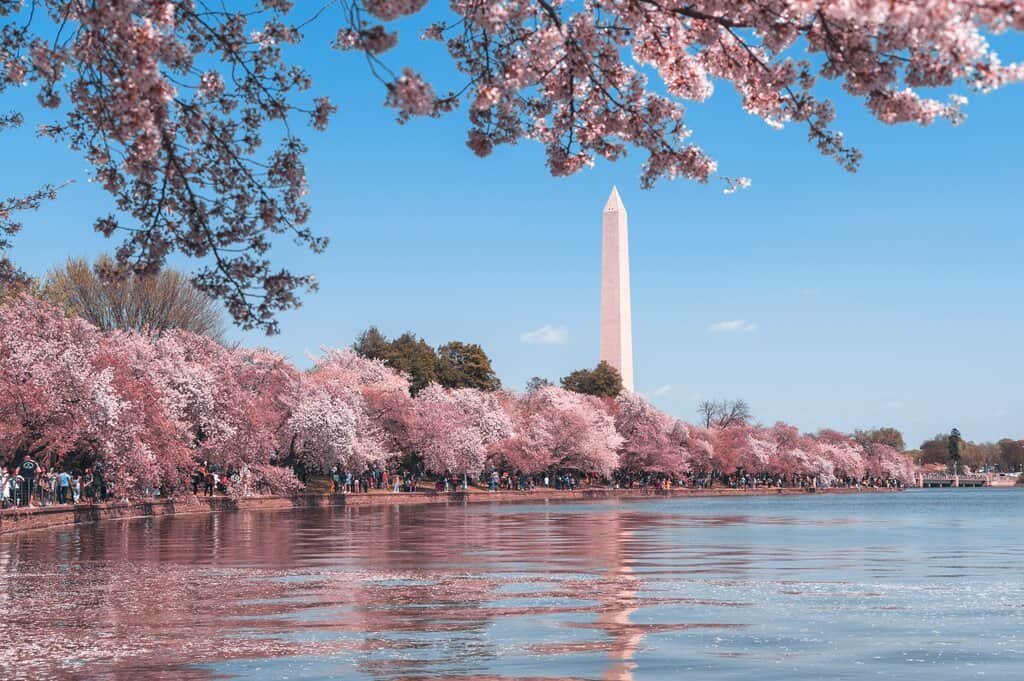
2 comments
Your kind killed DC culture
Haha, it has its draws, and certainly there are people who love it and the fast paced lifestyle.